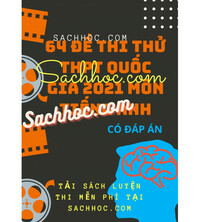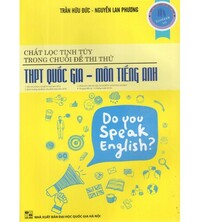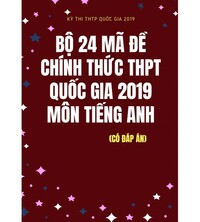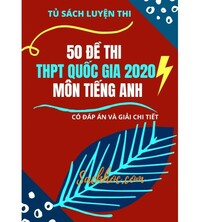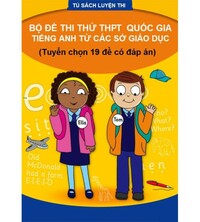Đề thi thử THPT Quốc gia môn Tiếng Anh
Đề thi thử THPT Quốc gia môn Tiếng Anh trường THPT Tháp Mười, Đồng Tháp năm 2015 được Tìm Đáp Án sưu tầm và đăng tải. Đây là tài liệu được cô giáo Võ Thị Tuyết Nga biên soạn, dùng để ôn tập môn Tiếng Anh THPT Quốc gia, luyện thi đại học khối A1, khối D, mời các bạn tham khảo.
Luyện thi đại học Tiếng Anh trực tuyến theo chuyên đề: Giới từ và các thành ngữ thường gặp trong đề thi Đại học
Luyện thi đại học Tiếng Anh online theo chuyên đề: Giản lược mệnh đề quan hệ
Đề thi thử THPT Quốc gia môn Tiếng Anh trường THPT Thanh Bình 1, Đồng Tháp năm 2015
| SỞ GDĐT ĐỒNG THÁP TRƯỞNG THPT THÁP MƯỜI | ĐỀ THI THỬ THPT QUỐC GIA - CẤU TRÚC 1 Thời gian làm bài: 90 phút (không kể thời gian phát đề) Đề có 07 trang |
PHẦN TRẮC NGHIỆM
Mark the letter A, B, C, or D on your answer sheet to indicate the word whose underlined part is pronounced differently from that of the rest in each of the following questions.
Question 1. A. option B. literature C. suggestion D. digestion
Question 2. A. chaos B. choir C. chorus D. machine
Mark the letter A, B, C or D on your answer sheet to indicate the word that differs from the rest in the position of the main stress in each of the following questions from 3 to 5:
Question 3. A. lotion B. escape C. prefer D. review
Question 4. A. procedure B. indicate C. forefinger D. enemy
Question 5. A. contemporary B. geometry C. trigonometry D. succession
Mark the letter A, B, C or D on your answer sheet to indicate the correct answer to each of the questions from 6 to 22:
Question 6. The police want ______ anything suspicious.
A. our report B. us to report C. us reporting D. that we will report
Question 7. There is a ______ in the kitchen.
A. beautiful large round wooden B. large round beautiful wooden
C. beautiful round large wooden D. wooden round large beautiful
Question 8. Miss White was very upset ______ the news of her father's death.
A. with B. about C. of D. by
Question 9. You ______ us about the changes in the plans. We need time to prepare for everything.
A. should have told B. must have told C. can't have told D. might have told
Question 10. As I won't be able to attend the meeting, I'd like you to sign ______.
A. on my place B. on my behalf C. on my name D. on my account
Question 11. I met the workers. Reporters interviewed them last week.
A. I met the workers who interviewed reporters last week.
B. I met the workers because reporters interviewed them last week.
C. I met the workers who were interviewed by reporters last week.
D. I met the reporters who interviewed workers last week.
Question 12. What ______ you used in picking a winner in the art contest?
A. is the criteria B. are the criteria C. are the criterions D. are the criterion
Question 13.______the phone rang later that night did Anna remember the appointment.
A. No sooner B. Only C. Not until D. Just before
Question 14. I have not seen my dog _______ the storm struck the community.
A. since B. while C. as soon as D. when
Question 15. Mary will have finished all her work _______.
A. as soon as her boss returned B. until her boss will return
C. by the time her boss returns D. when he-r boss will return
Question 16. San Diego is _______ town in Southern California.
A. more nice and nice B. the nicer
C. the nicest D. nicer and nicer
Question 17. He'd hardly finished doing his homework when you arrived, ______?
A. didn't he B. had he C. would he D. hadn't he
Question 18._______I borrow your lighter for a minute?
– Sure, no problem. Actually, you _______ keep it if you want to.
A. May / can B. Must / might C. Will / should D. Might / needn't
Question 19. - Linda: "I think it's a good idea to have three or four generations living under one roof. They can help one another."
- Janet: " ______. Many old-aged parents like to lead independent life in a nursing home."
A. That's not true B. Me, too
C. It's nice to hear that D. I agree with you completely
Question 20. Mary: " Shall I wait for you?" - Helen: " _______."
A. No, don't bother B. Yes, of course
C. No need to ask D. Why ask such a question?
Question 21. Students at university are called _______ while they are studying for their first degree.
A. postgraduates B. graduation C. graduates D. undergraduates
Question 22. A letter of ______ is sometimes really necessary for you in a job ______.
A. recommend / interviewer B. recommended / interviewing
C. recommendation / interview D. recommendation / interviewed
Question 23. "Would you like to come to my birthday party, Mary?" said Mike.
A. Mike was told to come to Mary's birthday party.
B. Mike didn't know that Mary had come to his birthday party.
C. Mike invited Mary to come to his birthday party.
D. Mike asked Mary if she didn't like to come to his birthday
Question 24. Which of these expressions is commonly used when people start a conversation?
A. Goodbye. See you later. B. Hello. What are you doing?
C. Well, it's been nice meeting you. D. Great. I'll see you tomorrow.
Mark the letter A, B, C or D on your answer sheet to indicate the word or phrase that is CLOSEST in meaning to the underlined part in each of the following questions from 25 to 29:
Question 25. When you see your teacher approaching you, a slight wave to attract his attention is appropriate.
A. coming nearer B. catching sight of
C. pointing at D. looking up to
Question 26. I didn't think his comments were very appropriate at the time.
A. correct B. right C. exact D. suitable
Question 27. Childbearing is the women's most wonderful role.
A. Giving birth to a baby B. Having no child
C. Bring up a child D. Educating a child
Question 28. I'll take the new job whose salary is fantastic.
A. acceptable B. pretty highs C. wonderful D. reasonable
Question 29. Certain courses are compulsory; others are optional.
A. voluntary B. free C. pressure D. mandatory
Mark the letter A, B, C or D on your answer sheet to show the underlined part that needs correction from 30 to 34:
Question 30. He seldom travels by bicycle before he went to Vietnam.
A B C D
Question 31. The blind is very difficult when seeing something.
A B C D
Question 32. Peter was having his hair cutting when John called.
A B C D
Question 33. These are the pictures who my son drew when he was young.
A B C D
Question 34. A novel is a story long enough to fill a complete book, in that
A B C
the characters and events are usually imaginary.
D
Read the passage and answer the questions that follow.
Accustomed though we are to speaking of the films made before 1927 as "silent," the film has never been, in the full sense of the word, silent. From the very beginning, music was regarded as an indispensable accompaniment; when the Lumiere films were shown at the first public film exhibition in the Unites States in February 1896, they were accompanied by piano improvisations on popular tunes. At first, the music played bore no special relationship to the films; an accompaniment of any kind was sufficient.
Within a very short time, however, the incongruity of playing lively music to a solemn film became apparent, and film pianists began to take some care in matching their pieces to the mood of the film.
As movie theaters grew in number and importance, a violinist, and perhaps a cellist, would be added to the pianist in certain cases, and in the larger movie theaters small orchestras were formed. For a number of years the selection of music for each film program rested entirely in the hands of the conductor or leader of the orchestra, and very often the principal qualification for holding such a position was not skill or taste so much as the ownership of a large personal library of musical pieces. Since the conductor seldom saw the films until the night before they were to be shown (if, indeed, the conductor was lucky enough to see them then), the musical arrangement was normally improvised in the greatest hurry.
To help meet this difficulty, film distributing companies started the practice of publishing suggestions for musical accompaniments. In 1909, for example, the Edison Company began issuing with their films such indications of mood as "pleasant," "sad," "lively." The suggestions became more explicit, and so emerged the musical cue sheet containing indications of mood, the titles of suitable pieces of music, and precise directions to show where one piece led into the next.
Certain films had music especially composed for them. The most famous of these early special scores was that composed and arranged for D.W. Griffith's film Birth of a Nation, which was released in 1915.
Question 35. The passage mainly discusses music that was _______ .
A. performed before the showing of a film
B. played during silent films
C. specifically composed for certain movie theaters
D. recorded during film exhibitions
Question 36. What can be inferred from the passage about the majority of films made after 1927?
A. They were truly "silent."
B. They were accompanied by symphonic orchestras.
C. They incorporated the sound of the actors' voices.
D. They corresponded to specific musical compositions.
Question 37. The word "solemn" is closest in meaning to_______.
A. simple B. serious C. short D. silent
Question 38. It can be inferred that orchestra conductors who worked in movie theaters needed to ______ .
A. be able to play many instruments
B. have pleasant voices
C. be familiar with a wide variety of music
D. be able to compose original music
Question 39. The word "them" refers to _______ .
A. years B. hands C. pieces D. films
Question 40. According to the passage, what kind of business was the Edison Company?
A. It produced electricity. B. It distributed films.
C. It published musical arrangements. D. It made musical instruments.
Question 41. It may be inferred from the passage that the first musical cue sheets appeared around _______.
A. 1896 B. 1909 C. 1915 D. 1927
Question 42. Which of the following notations is most likely to have been included on a musical cue sheet of the early 1900's?
A. "Calm, peaceful" B. "Piano, violin"
C. "Key of C major" D. "Directed by D.W. Griffith"
Question 43. The word "scores" is closest in meaning to_______.
A. totals B. successes
C. musical compositions D. groups of musicians
Question 44. The passage probably continues with a discussion of _______.
A. famous composers of the early twentieth century
B. other films directed by D.W. Griffith
C. silent films by other directors
D. the music in Birth of a Nation
Read the following passage on transport, and mark the letter A, B, C, or D on your answer sheet to indicate the correct answer to each of the questions from to 54.
Most journeys in Britain and the US are made by road. Some of these are made on public transport but most are by private car.
In Britain many people rely on their cars for daily local activities, e.g. getting to work, doing the shopping, and visiting friends. People living in urban areas may use buses, trains or, in London, the Underground, to get to city centres, mainly because traffic is often heavy and it is difficult to find anywhere to park a car. Some places in the country may have a bus only two or three times a week so people living there have no choice but to rely on their cars.
In the US large cities have good public transportation systems. The El railroad in Chicago and the underground systems of New York, Boston, San Francisco and Washington, DC are heavily used. Elsewhere, most Americans prefer to use their cars. Families often have two cars and, outside major cities, have to drive fairly long distances to schools, offices, shops, banks, etc. Many college and even high-school students have their own cars.
Long-distance travel in Britain is also mainly by road, though railways link most towns and cities. Most places are linked by motorways or other fast roads and many people prefer to drive at their own convenience rather than use a train, even though they may get stuck in a traffic jam. Long-distance coach/bus services are usually a cheaper alternative to trains, but they take longer and may be less comfortable. Some long-distance travel, especially that undertaken for business reasons, may be by air. There are regular flights between regional airports, as well as to and from London. A lot of freight is also distributed by road, though heavier items and raw materials often go by rail.
In the US much long-distance travel is by air. America has two main long-distance bus companies, Greyhound and Trailways. Amtrak, the national network, provides rail services for passengers. Private railway companies such as Union Pacific now carry only freight, though in fact over 70% of freight goes by road.
The main problems associated with road transport in both Britain and the US are traffic congestion and pollution. It is predicted that the number of cars on British roads will increase by a third within a few years, making both these problems worse. The British government would like more people to use public transport, but so far they have had little success in persuading people to give up their cars or to share rides with neighbours. Most people say that public transport is simply not good enough. Americans too have resisted government requests to share cars because it is less convenient and restricts their freedom. Petrol/gasoline is relatively cheap in the US and outside the major cities public transport is bad, so they see no reason to use their cars less.
(Extracted from Oxford Guide to British and American Culture, Oxford University Press, 2000)
Question 45: In Britain and the US most people travel by ______.
A. sea B. rail C. road D. air
Question 46: According to the passage, people in London may prefer the Underground to their own cars due to ___.
A. cheap tickets B. air pollution C. long distances D. heavy traffic
Question 47: It is mentioned in paragraph 3 that the public transportation systems in the US are good in _______.
A. some states B. all cities C. large states D. large cities
Question 48: Which of the following is NOT true according to the passage?
A. Few college students in the US have their own cars.
B. Families in the US often have more than one car.
C. Most Americans prefer to drive their cars outside large cities.
D. The underground systems are popular in some major US cities.
Question 49: The phrase "at their own convenience" in paragraph 4 is closest in meaning to _______.
A. at the latest time and nearest place
B. at an appropriate time and place
C. at an early time and nearby place
D. at the fastest time and nearest place
Question 50: Which of the following is true about transport in Britain?
A. Long-distance travel in Britain is only by road.
B. There are no regular flights between regional airports.
C. Trains are usually cheaper than long-distance coach services.
D. Heavier items and raw materials are often transported by train.
Question 51: According to the information in paragraph 5, long-distance travellers in the US can choose from _______ mode(s) of transport.
A. four B. two C. one D. three
Question 52: It is stated in the passage that the major problems of road transport in Britain and the US are ______.
A. speeding and bad roads B. accidents and pollution
C. traffic jams and pollution D. drink-driving and traffic jams
Question 53: According to the passage, people in Britain refuse public transport because _______.
A. they like to share rides with neighbours
B. they think it is not good enough
C. they see no reason to use their cars less
D. petrol is relatively cheap in Britain
Question 54: The word "they" in the last sentence of the passage can best be replaced by _______.
A. the government B. major cities
C. Americans D. neighbours
Read the following passage on social issues in American schools, and mark the letter A, B, C, or D on your answer sheet to indicate the correct word for each of the blanks from 55 to 64.
In addition to the challenge to be excellent, American schools have been facing novel problems. They must (51)_______ with an influx of immigrant children, many of whom speak little or no English. They must respond to demands (52) _______ the curriculum reflect the various cultures of all children. Schools must make sure that students develop (53) _______ skills for the job market, and they must consider the needs of nontraditional students, such as teenage mothers.
Schools are (54) ______ these problems in ways that reflect the diversity of the US educational system. They are hiring or training large numbers of teachers of English (55) ______ a second language and, in some communities, setting up bilingual schools. They are opening (56) ______ the traditional European-centered curriculum to embrace material from African, Asian, and other cultures.
Schools are also teaching cognitive skills to the (57) ______ 40 percent of American students who do not go on to higher education. In the (58) _______ of a recent report by the Commission on Achieving Necessary Skills, "A strong back, the willingness to work, and a high school diploma were once all that was necessary to (59) _______ a start in America. They are no longer. A well-developed mind, a continued willingness to learn and the ability to put knowledge to work are the new keys (60) ______ the future of our young people, the success of our business, and the economic well-being of the nation." (Extracted from InfoUSA – CD Version)
Question 55: A. cope B. stay C. fight D. do
Question 56: A. what B. that C. whether D. who
Question 57: A. basis B. base C. basics D. basic
Question 58: A. discharging B. distributing C. delivering D. addressing
Question 59: A. as B. from C. with D. like
Question 60: A. for B. into C. up D. on
Question 61: A. nearly B. mostly C. slightly D. fairly
Question 62: A. directions B. words C. minds D. ways
Question 63: A. get B. take C. make D. bring
Question 64: A. at B. for C. to D. in
WRITING
Part I. Finish each of the following sentences in such a way that it means the same as the sentences printed before
1. She said: "I can't meet you here either today or tomorrow, Nam."
She told Nam .................................................................................
2. We don't allow anyone to use dictionaries during the examination.
Nobody ..........................................................................................
3. The coffee is so hot that he can't drink it.
The coffee is too ...........................................................................
4. Nam is the most intelligent boy in my class.
Noone ...........................................................................................
5. She started learning English 3 years ago.
She has ........................................................................................
Part II. Writing a paragraph about 140 words to answer this question:
Nowadays, computers play an important part of people's everyday lives. They have improved the way people live. Do you agree or disagree?
Đáp án đề thi thử THPT Quốc gia môn Tiếng Anh
PHẦN TRẮC NGHIỆM
| 1. B 2. D 3. A 4. A 5. C 6. B 7. A 8. B | 9. A 10. B 11. C 12. B 13. C 14. A 15. C 16. C | 17. B 18. A 19. A 20. A 21. D 22. C 23. C 24. B | 25. A 26. D 27. A 28. C 29. A 30. B 31. B 32. C | 33. C 34. C 35. B 36. D 37. B 38. C 39. D 40. B | 41. B 42. A 43. C 44. D 45. C 46. D 47. D 48. A | 49. B 50. D 51. D 52. C 53. B 54. C 55. A 56. B | 57. D 58. D 59. A 60. C 61. A 62. B 63. C 64. C |
PHẦN TỰ LUẬN
PART I:
1. She said: "I can't meet you here either today or tomorrow, Nam"
She told Nam she couldn't meet him either that day or the day after.
2. We don't allow anyone to use dictionaries during the examination.
Nobody is allowed to use dictionaries during the examination.
3. The coffee is so hot that he can't drink it.
The coffee is too hot for him to drink.
4. Nam is the most intelligent boy in my class.
Noone in my class is more intelligent than Nam.
5. She started learning English 3 years ago.
She has learnt/learned English for 3 years. / She has been learning English for 3 years.
PART II:
1. Nội dung:
- Đúng chủ đề: 0,25đ
- Hợp logic: 0,25đ
2. Ngôn ngữ:
- Viết đúng cấu trúc ngữ pháp: 0,25đ
- Sử dụng từ vựng phù hợp và phong phú: 0,25đ
3. Trình bày:
- Viết đủ số từ: 0,25đ
- Mạch lạc, rõ ràng, sáng tạo: 0,25đ
4. Điểm trừ:
- Sai lỗi ngữ pháp: trừ tối đa 0,125đ
- Sai lỗi chính tả: trừ tối đa 0,125đ
- Ít hơn số từ qui định: trừ 0,125đ
